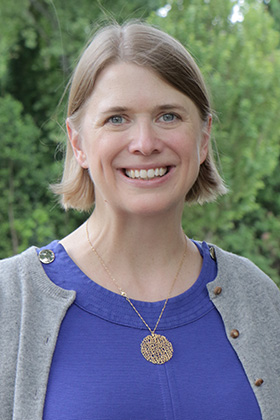Eleven general agencies of The United Methodist Church are pledging to achieve net-zero greenhouse gas emissions by 2050 across ministries, facilities, operations and investments. The initiative was announced on Earth Day.
“I think it’s important for us as stewards of God’s resources,” said Roland Fernandes, chief executive of the United Methodist Board of Global Ministries, one of several agencies leading the denomination’s environmental efforts.
“It’s exciting that we’re having all these sister agencies join us because … there’s so much more momentum and even excitement that we can get into this really important need for our time.”

Net-zero emissions means the amount of human-produced greenhouse gas emissions does not exceed the amount taken out of the atmosphere, according to the World Resources Institute. Greenhouse gas removal is achieved by tactics such as restoring forests or direct air capture and storage.
The agencies committed to the goal are the United Methodist Board of Church and Society, Board of Global Ministries, Board of Higher Education and Ministry, Commission on Archives and History, Commission on the Status and Role of Women, Communications, Council on Finance and Administration, Discipleship Ministries, United Methodist Men, United Methodist Women, and Wespath Benefits and Investments.
“Within our distinct areas of ministry and throughout our global connection, we are embarking on a new course of action to match the urgency of this moment,” reads a joint statement from the leaders of the 11 agencies.
“We will work both to reduce the principal cause of climate disruption — greenhouse gas emissions — and to support a just and equitable transition that dismantles structural barriers to racial and gender equity and builds resilient, flourishing communities.”
Caring for creation “is a Biblical directive, God’s very first charge to humans in Genesis,” said Harriett Jane Olson, top executive of United Methodist Women. “When we fail to care for creation, women and children on the margins are most at risk in terms of their health and livelihoods.”

Although the United Methodist Commission on Religion and Race and Publishing House have yet to sign on, neither has rejected the proposal, said the Rev. Jenny Phillips, senior technical advisor for environmental sustainability at Global Ministries.
“No one has said no,” Phillips said. “Those who haven’t committed have said, ‘We’re trying to better understand what this would mean for our agency,’ which I totally affirm.”

The goal is being set before a plan exists to get there, Phillips said.
“We made this commitment as a first step in saying we are committed to making a plan and living into it,” she said. “The next thing … are the plans for the next five years … and then keep going along like that.
“We can’t bite it all off at once, but there’s a lot of low-hanging fruit.”
One thing that can be done immediately is better energy efficiency at many United Methodist properties, Phillips said. It turns out that even the headquarters of Global Ministries in Atlanta can be improved. That building is already certified the highest level of “platinum” by Leadership in Energy and Environmental Design, a green building certification program developed by the U.S. Green Building Council.
“We had an energy audit, and our auditor identified a huge number of opportunities for efficiency that’s going to save us 17% of our annual energy budget when we implement the changes,” Phillips said.
Common building fixes include coordinating thermostat settings and replacing old boilers and other equipment.
“It is a natural choice for United Methodist Men to join Net-Zero 2050,” said its top executive, Gil Hanke. “We have already taken steps in this direction, such as installing solar-powered entrance gates and cameras to secure our building. We take recycling seriously and encourage sustainable practices with employees.”

In West Africa, a pilot energy study is planned at 13 United Methodist clinics to help develop an energy plan, including how to finance it, Phillips said.
“There are strategies when we’re looking at doing solar across multiple sites and different ways we can finance it than when we are doing one-off projects,” she said.
‘Committed to caring for our future’

In the “Natural World” section of the United Methodist Book of Discipline, denomination leaders “acknowledge the global impact of humanity’s disregard for God’s creation. … We therefore … call on individuals, congregations, businesses, industries and communities to reduce their emissions.”
At Discipleship Ministries, a task force will “evaluate where we are and where we need to go in order to fulfill this pledge,” said Jeff Campbell, acting chief executive.
“We also commit to continue creating resources to help disciples understand that our involvement in creation care is an essential part of discipleship."
When considering how to pay for cutting greenhouse gas emissions, it should be noted that a high price is already being paid for climate change, Phillips said.
“When we look at our work on disaster response, the extreme nature, the extreme frequency of storms, the intensity, the wildfires — all of that has a cost as well. … We’re so focused on alleviating suffering. I think we also have to be investing in addressing the root causes of that suffering.”

Patterson is a UM News reporter in Nashville, Tennessee. Contact him at 615-742-5470 or newsdesk@umcom.org. To read more United Methodist news, subscribe to the free Daily or Weekly Digests.
Like what you're reading? Support the ministry of UM News! Your support ensures the latest denominational news, dynamic stories and informative articles will continue to connect our global community. Make a tax-deductible donation at ResourceUMC.org/GiveUMCom.




